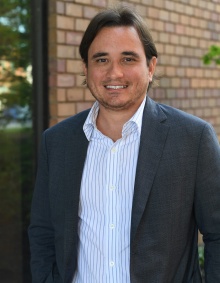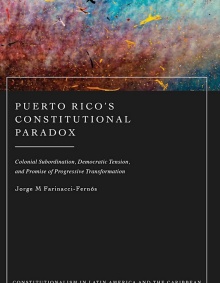
Working the puzzle of constitutional law
Jorge Farinacci-Fernós, Visiting Assistant Professor of Law
“A jurist is a legal chemist,” says Jorge Farinacci-Fernós, who is beginning a yearlong visiting assistant professorship at UB School of Law. “We just put two things together and something interesting happens.”
Such as, he notes, the Ninth Amendment to the U.S. Constitution, on which he’ll be teaching a seminar, along with a broader Constitutional Law course. The amendment protects those rights that are not specifically enumerated, stating “The enumeration in the Constitution, of certain rights, shall not be construed to deny or disparage others retained by the people.”
This poses a problem for textualist interpreters. Farinacci-Fernós asks: “What do you do when text is telling you that some things are not in the text? How do you address the fact that the Constitution was written in a way that you have these rights and others? What is a textualist to do?”

Pre-order Farinacci-Fernós' book "Puerto Rico’s Constitutional Paradox: Colonial Subordination, Democratic Tension, and Promise of Progressive Transformation" from Bloomsbury Publishing.
It’s that kind of conundrum that fascinates Farinacci-Fernós, who comes to UB Law from Interamerican University of Puerto Rico Law School, in San Juan, where he has taught since 2017. A Puerto Rico native, he holds bachelor’s and master’s degrees from the University of Puerto Rico, the J.D. from that university’s School of Law, a master of laws degree from Harvard Law School and an S.J.D. from Georgetown University Law Center.
Farinacci-Fernós comes from a legal-minded family. His father was a labor lawyer and his mother, a longtime law professor who also advocated for housing rights for working people and served as Puerto Rico’s women’s affairs minister. “I was exposed to this at a very young age,” he says. “I started reading decisions from the Puerto Rico Supreme Court at age 10.”
He took part in a virtual panel a couple of years ago, sponsored by the Buffalo Law Review, about Puerto Rico’s territorial status, and says that being at UB Law presents a unique opportunity to further his scholarship. “You can write anywhere,” says Farinacci-Fernós, whose widely published research and writing is in both English and Spanish, and centers on constitutional law. “But the extra pep, the icing on the cake, is the collaborative atmosphere of brainstorming and meeting in the hallways and exchanging emails and workshops. It’s like running—you run better with other professionals, you pick up the pace. And you get good feedback, new perspectives, and insight that you really do appreciate. I feel like it’s an incubator in that sense. I enjoy the law more when I’m writing about it, and I hope to write as much as I can.”
And he’s willing to follow his curiosity where it leads. For example, having noticed a peculiar similarity of ideas in Puerto Rico’s Constitution and the state of Montana’s, he investigated and wrote “Curious In-Laws: The Legal Connections Between Montana and Puerto Rico” for the Montana Law Review. One startling discovery: one of Puerto Rico’s first justices had served as a justice in pre-statehood Montana.
In a project of much broader scope, Farinacci-Fernós is in the final stages of completing a book, Puerto Rico’s Constitutional Paradox: Colonial Subordination, Democratic Tension, and Promise of Progressive Transformation (Bloomsbury). Chapter by chapter, the author uses the lenses of democracy, colonialism, and progressive transformation to look at the development and interpretation of the island’s Constitution, which was written in 1952 after centuries of colonial occupation by Spain and the United States.
“Puerto Rico’s Constitution is very inspiring, but it was absolutely colonial,” he says. “It’s very progressive, but it has not been used adequately. It’s extremely democratic, but the institutions it created were not. These are the paradoxes that I try to work through.”
And his scholarly curiosity has been recognized and applauded. His book, La Carta de Derechos (The Bill of Rights), which analyzes each of the more than 50 individual rights recognized by the Puerto Rico Constitution, recently received the Puerto Rican Bar Association’s 2022 Best Legal Work Award. Just two years ago, in 2020, the Association bestowed the same award to Farinacci-Fernós for his book on the interpretation of legal texts, Hermenéutica Puertorriqueña: Cánones de interpretación jurídica (Puerto Rican Hermeneutics: Canons of legal interpretation).